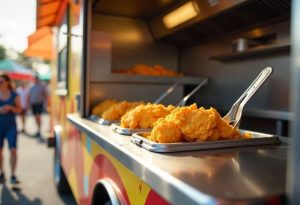Food Truck Buying Guide by European Food Truck Festival – In recent years, the food truck industry has experienced significant growth, becoming a popular option for entrepreneurs to establish culinary ventures with comparatively low overhead in comparison to traditional restaurants. Nevertheless, the establishment of a prosperous food truck enterprise necessitates meticulous preparation and well-informed decision-making, particularly in the context of purchasing a truck. This all-inclusive food truck purchasing guide will guide you through the purchasing process, the various types of vehicles that are available, and the financing options that are available to you.
The acquisition of a food truck is an exhilarating step toward entrepreneurship; however, it necessitates a meticulous approach and meticulous attention to detail. By meticulously examining potential trucks, selecting the appropriate form of vehicle, comprehending legal requirements, and composing a robust business plan, you establish a foundation for success. By prudently financing operations, it is possible to maintain operations without incurring excessive debt.
Prior to making a decision, allocate sufficient time to conduct thorough investigation and evaluate your alternatives. In the current competitive mobile food market, your food truck business can flourish with the appropriate preparation and commitment. Let us delve in.

Pre-Purchase Considerations for Food Truck Buying Guide
It is imperative to establish a robust business foundation prior to making any decisions regarding the acquisition of a food truck. A successful food truck operation necessitates more than just a vehicle; it necessitates a realistic financial plan, a comprehensive understanding of regulations, and a distinct business concept.
Business Plan & Concept
The development of a comprehensive food truck business plan is one of the initial and most critical stages. Your vision, target market, operational strategy, and financial projections should be delineated in this plan.
- Market research: Determine the demographic of your primary consumers. Are you targeting a particular neighborhood, late-night throngs, festival-goers, or office workers during lunch hours? Tailoring your menu and marketing strategy will be facilitated by comprehending your audience. Analyzing your competitors is equally critical. What restaurants or food trucks are currently functioning in your region? What sectors do they occupy? What are the market gaps that your lorry could exploit?
- Cuisine: Your business model is significantly influenced by your culinary concept. Tacos, BBQ, gourmet burgers, coffee, vegan specialties, or fusion cuisine are among the most popular concepts. Assess the types of cuisine that you are enthusiastic about, the foods that resonate with your target audience, and the offerings of your competitors. Offering a concise, focused menu can occasionally be advantageous in a small space, as it simplifies operations.
- Budget: Determine the amount of money you are willing and able to allocate. In addition to the truck’s initial cost, you will need to account for kitchen equipment (grills, fryers, refrigerators), licenses and permits, insurance, an initial food inventory, and marketing. It is important to consider ongoing expenses, including fuel, maintenance, salaries (if employing), and location fees. Having a well-defined food truck budget guarantees that you will not be financially surprised.
Legal & Regulatory Requirements (Food Truck Buying Guide)
Operating a food truck involves navigating various regulatory requirements which vary by city, county, and state. Compliance is non-negotiable as violations can lead to fines or closure.
- Permits & Licenses: These often include a general business license, health department permit, fire department inspection, and a mobile vendor permit. Health regulations are particularly stringent because of the food preparation involved. Make sure you understand what inspections your truck must pass before you open for business.
- Zoning Laws: Check where you are legally allowed to park and operate your food truck. Many cities have designated zones or specific times allowed for food trucks. Some places restrict parking near brick-and-mortar restaurants or require permission from private property owners.
- Insurance: Protecting your investment means securing the right insurance policies. You will need vehicle insurance as well as liability insurance that covers your food truck operations in case of accidents or food-related illness claims. Insurance providers specializing in mobile food businesses can offer tailored coverage.
By thoroughly understanding and preparing for these requirements, you set a solid legal foundation for your food truck business.
Types of Food Trucks to Buy
When it’s time to buy your vehicle, you have several options. Each type has its pros and cons, depending on your business goals, budget, and timeline.
New Food Trucks (Food Truck Buying Guide)
Purchasing a brand-new food truck allows you to customize the design and kitchen layout to your exact specifications. You can choose state-of-the-art kitchen equipment and ensure the vehicle meets all current safety and health standards. Many manufacturers offer warranties and financing options, which can ease the upfront cost.
- Pros: Custom build, new equipment, warranty coverage, often eligible for financing.
- Cons: High initial investment, waiting time for construction (sometimes several months), potential delays due to customization requests.
A new truck is ideal if you want full control over your design and are willing to wait for the perfect setup.
Used Food Trucks
If you are eager to start quickly or have a limited budget, a used food truck is a viable option. Many used trucks come fully outfitted and may include valuable assets such as permits, established branding, or an existing customer base.
- Pros: Lower purchase price, immediate availability, some come “business-ready.”
- Cons: Potential hidden repair costs, older equipment might need replacement or maintenance, unknown usage history might affect reliability.
Inspecting a used food truck thoroughly and reviewing its history can mitigate risks.
Food Trailers vs. Food Carts
Besides trucks, mobile food vendors often consider trailers or carts.
- Food Trailers: These are towed by a separate vehicle. Trailers tend to be less expensive than trucks and provide flexibility if you want to detach and park your kitchen separately. However, they require an additional vehicle capable of towing, which adds another cost and logistical consideration.
- Food Carts: The smallest and most portable option, carts are usually pushed or stationary and serve limited menu items. They represent a low-cost entry point, but their small size constraints kitchen capabilities.
Deciding between these options depends on your menu complexity, budget, and preferred mobility.
The Buying Process of Food Truck Buying Guide
Knowing where and how to search for your food truck is critical to making a good deal and avoiding pitfalls.
Where to Look
- Online Marketplaces: Websites such as Craigslist, eBay, and specialized food truck sale platforms list available vehicles nationwide. Here you can find both new and used trucks.
- Manufacturers and Dealers: Buying directly from reputable food truck builders offers customization and warranties. Dealers may also have pre-built used trucks available.
- Brokers: These professionals act as intermediaries who connect buyers and sellers, helping to negotiate terms and inspect trucks.
- Auctions: Government and private auctions can occasionally provide trucks at discounted prices, but often without warranties or detailed histories.
What to Inspect
Once you find a potential truck, a thorough inspection is crucial:
- Vehicle Condition: Check the engine, transmission, mileage, tires, and brakes. If you are not mechanically savvy, hire a trusted mechanic to perform this evaluation.
- Kitchen Equipment: Verify that appliances such as grills, fryers, refrigerators, and ovens are functional and properly installed.
- Plumbing and Electrical Systems: Inspect sinks, water tanks, water pumps, wiring, circuit breakers, and generators to confirm they meet health codes and safety standards.
- Exterior: Look for rust, dents, leaks, or damage that could impact usability or resale value.
A detailed food truck inspection checklist will help you cover all critical components and avoid costly surprises after purchase.
Financing Your Purchase
Purchasing a food truck can be a significant investment, and exploring financing options can make ownership more accessible.
Loan Options
- SBA Loans: The Small Business Administration offers loans designed for small businesses, often with lower down payments and favorable interest rates than traditional loans. SBA loans require a rigorous application process and good credit but can provide substantial funding.
- Traditional Bank Loans: Many banks and credit unions offer commercial loans specifically for food trucks. Interest rates and terms vary based on creditworthiness and business plans.
- Equipment Financing: Some lenders specialize in loans for purchasing kitchen equipment or vehicles. These loans may require collateral but can be tailored to your needs.
Other Payment Methods
- Cash: If you can afford it, paying with cash avoids interest and debt obligations. This can give you strong negotiating power during purchase.
- Leasing: Leasing a food truck offers monthly payments without full ownership, which is a flexible option if you want to minimize upfront costs and plan for upgrades later.
Using a food truck loan calculator can help you estimate monthly payments and determine what fits your budget best.



